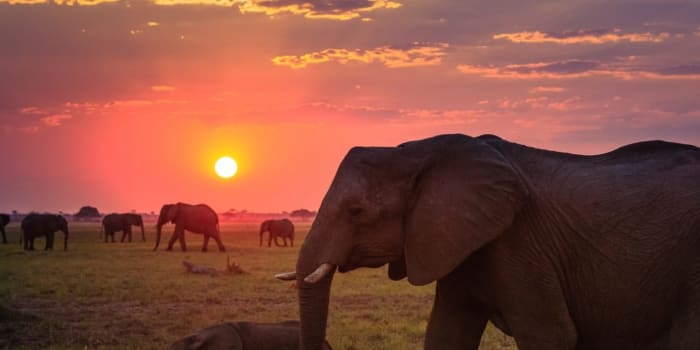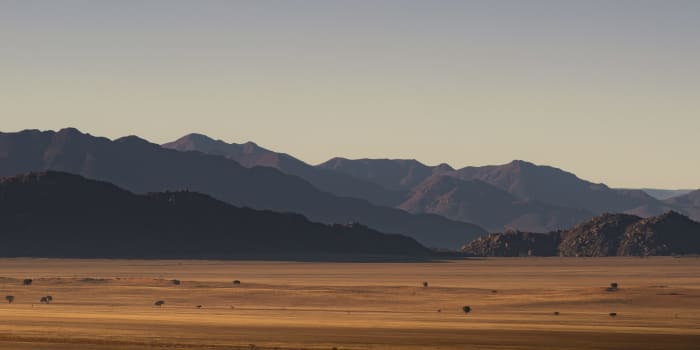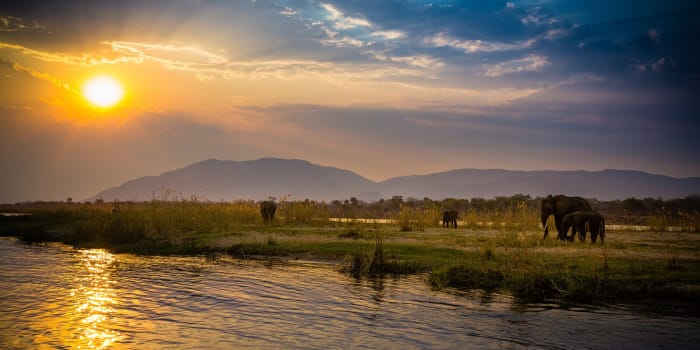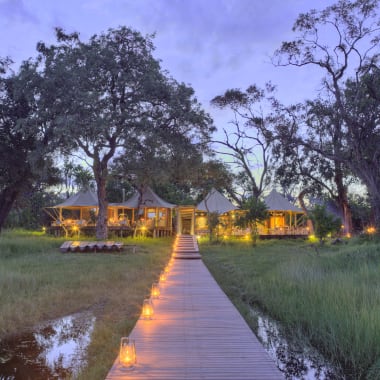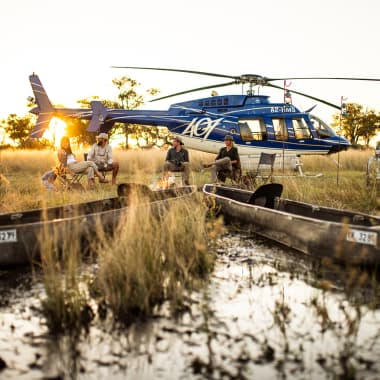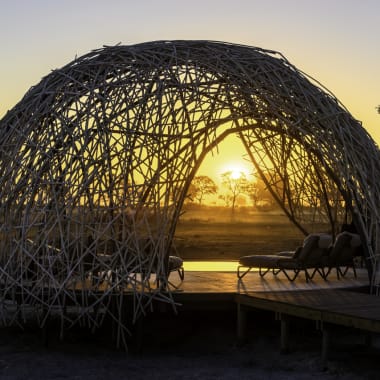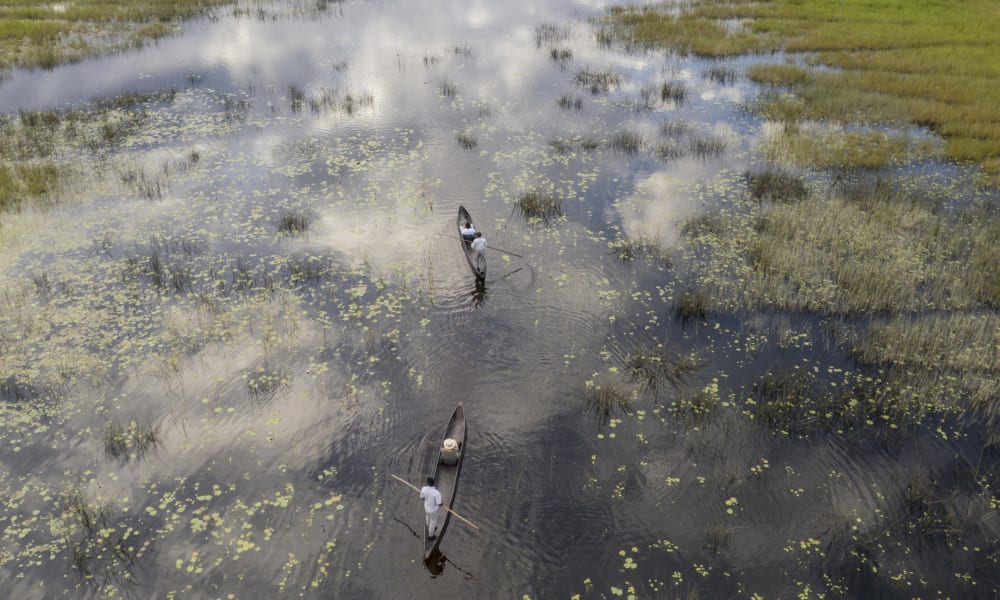
Okavango Delta
Top-class safari experiences
Welcome to the Okavango Delta, one of the largest inland deltas in the world! Located in the north of Botswana, this UNESCO World Heritage Site is characterized by its unique ecosystem. The combination of desert and marshland is its most exciting feature. However, unlike the usual inland deltas, the Okavango River flowing through the delta does not flow into the sea or another body of water: it seeps into the sand of the Kalahari Desert. Surrounded by swamps and lagoons, grasslands and forests, the entire area covers more than 2,000,000 hectares.
Various climatic and biological processes shape the delta system. The flora and fauna adapt their life cycles to the periods of rain and flooding. The originally dry desert area is transformed into a picture-book landscape during the rainy season. Suddenly the area shines in a red-golden glow and is adorned with green trees and bushes, flowering shrubs and in some places even exotic flowers and fruits. More than 1,000 plant species can be admired in this southern part of Africa.
Best time to travel
Okavango Delta - a true wildlife paradise
Biodiversity is also very important in the Okavango Delta. There are over 100 species of mammals, more than 400 bird species, over 60 reptile species and around 90 different fish. The Big Five (elephants, rhinos, buffalo, lions and leopards) are a particular highlight for travelers. And bird lovers are also likely to be wide-eyed as they read these lines: The high density of birds makes the Okavango Delta a true paradise for them.
Discover the Okavango Delta in all its glory
In the Okavango Delta, the focus is clearly on nature and its animal inhabitants. There is a large selection of different safaris to get to know the flora and fauna. Whether by jeep, on foot or by boat - there is something to suit every taste.
Game drives
On classic game drives, usually in the cooler morning or late afternoon hours, you explore the African wilderness in an open off-road vehicle. These drives allow you to cover long distances and observe a variety of wild animals in their natural environment. Thanks to the protection of your vehicle, this type of safari gives you the opportunity to get particularly close to big game such as elephants, lions or leopards.

Walking safaris
If you are looking for an even more intense nature experience, then foot safaris are just the thing for you. Together with an experienced guide, you will hike along old animal trails, learn to read tracks and focus on the smaller things in the wilderness. Learn about plant life and the importance of the small creatures in our ecosystem that are often overlooked on game drives. Walking through the same trails as elephants and zebras creates a unique connection to nature and intensifies the safari experience by getting close to the wildlife and environment.

Boat safaris
On the water, however, the scenery is particularly romantic. The so-called mokoro trip is a traditional option in the Okavango Delta: A guide leads the travelers through the waters in a dugout canoe - a hollowed-out tree trunk. Between colorful frogs and salamanders, he feels his way through the sometimes dense reeds with the help of long sticks. Sometimes you can even see the tracks left by zebras on the ground during the dry season. A walk to observe wildlife on one of the island formations rounds off this extraordinary experience.

Helicopter sightseeing flight
The huge delta can also be admired from a bird's eye view. A sightseeing flight in a small plane is another interesting option and is guaranteed to provide unforgettable moments.

Bird watching
The Okavango Delta is not only a paradise for bird lovers - the wetlands provide a wonderful habitat for the birds themselves. The rainy season transforms nature into a blossoming oasis, providing both native bird species and migratory birds from North Africa, Europe and Asia with a sought-after resting place. Wattled cranes, brown-throated herons and banded fish owls are just a small selection of the feathered species that live here.

Moremi Game Reserve
The Moremi Game Reserve in the "Land of Rivers", as the explorer David Livingstone once called the area, was founded in 1963. It is the first and therefore oldest protected reserve in the Okavango Delta. Here you will find a multitude of fantastic lodges that offer you everything you need for a comfortable stay. You are simply spoiled for choice. But no matter which accommodation you choose, you will find one thing everywhere: a high degree of privacy so that you can relax completely in harmony with nature. In the middle of the wilderness, you can look forward to a lot of comfort, traditional design and a luxurious ambience in addition to nature and wildlife experiences.
Okavango Delta: The best time to go on safari
The climate in the Okavango Delta can be described as subtropical. While the African summer lasts from November to April, the winter lasts from May to October. Summer is considered the rainy season, when humidity is very high and average temperatures reach up to 35 degrees. Short but heavy downpours are not uncommon and thunderstorms can sometimes occur. The African winter, on the other hand, falls in the dry season. Temperatures average 25 degrees, with some very cold nights of 8 to 4 degrees.
The climatic conditions at a glance:
- Summertime: November to April (average 35 degrees Celsius, high humidity, short and heavy rain showers, risk of flooding)
- Winter season: May to October (average 25 degrees, 8 to 4 degrees at night, low humidity, dry)
However, the water levels only reach their peak a few months after the start of the rainy season. This means that the Okavango Delta is only really flooded by the Okavango River between March and June. This also attracts the many animal species that live in this area. But even outside the main rainy season, the animals prefer to stay around the watercourses, as these are the only source of water due to the lack of rain.
The ideal time to visit is therefore from May to October, with a good mix of pleasant temperatures and dry periods. The latter in particular is noticeable in the lower humidity and much more passable roads. The vegetation is also less dense during this time, which makes it easier to spot animals.
Due to the high bird density, bird watching in the Okavango Delta is possible all year round. However, the greatest variety is found from mid-November to mid-February, as migrant birds are also present here during this time in addition to the native bird species.
Okavango Delta safaris
Das Okavango Delta ist ein einzigartiges Naturschauspiel. In einem Mokoro zu sitzen, auf dem ruhigen Wasser zu gleiten und dabei Elefanten zu beobachten, ist wie als wäre man in einer anderen Welt – eine Welt, in der die Zeit stillzustehen scheint und jeder Moment ein Geschenk der Natur ist.
Lodges in Okavango Delta
To book a trip or for more information, contact us. We'll help you plan and guide you through your upcoming adventure!


